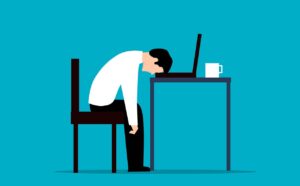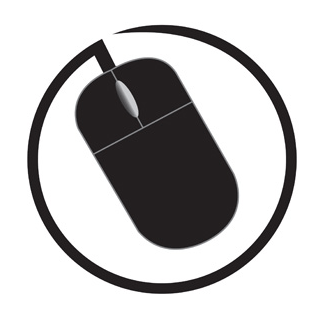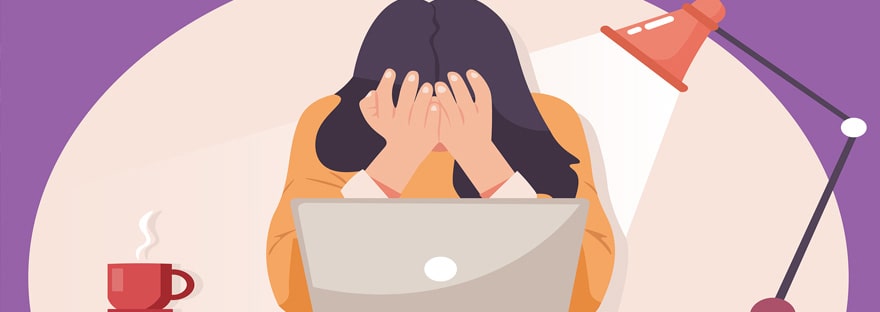Stress… it’s that dirty word no one likes to think about. Nevertheless, it’s an essential part of life. In a world overrun by pressure, here are 10 simple ways to relieve stress when you are restricted from leaving a designated area.
Stress is a natural reaction we all experience when frightened or in danger. It’s designed to help us respond to pressure accordingly, such as fight or flight mode. It keeps us more alert and motivated. It helps us overcome challenges and achieve goals. But how much stress is too much? Short-term stress is known to aid the immune system. But chronic stress can lead to serious illnesses, depression, and anxiety disorders.
The Risks of Too Much Stress
As we evolved over the thousands of years, we fine-tuned the skill of imagination. However, the human brain can’t differentiate between real situations and imagined ones. So, the more we think about our fears, the longer our bodies remain in a survival mode.
The ‘Fight or flight’ response is designed for short bursts to get you out of danger. Your body fills with adrenalin. Blood pressure increases to move oxygen around your muscles. Your pupils dilate to see better. Your hearing intensifies. The sympathetic nervous system will keep you in a cautious state to fight or escape. If we were to stay in this condition long-term, it can cause all sorts of afflictions.

Here are clear signs of experiencing stress…
5 Emotional Signs of Stress
- Feeling flat and withdrawn.
- Feeling agitated and angry.
- Feeling frazzled and confused.
- Crying and being afraid.
- Feeling foggy and unable to make decisions.
5 Physical Signs of Stress
- Tense muscles, tight jaw, clenched hands, etc.
- Stomach cramps.
- Headaches or migraines.
- Racing heartbeat.
- Shallow fast breathing.
Long-term Effects of Stress
- Heart disease.
- Nervous system dysfunctions.
- Lowered immune system.
- Various illnesses, including ulcers and cancer.
- Anxiety disorders, depression, or suicide.
- Broken relationships.
- Bad life choices.
- Damaged reputation.
How can I lower my stress levels?
People might say ‘Don’t stress’, but it’s not always as easy as snapping the fingers. Especially if the stress factors are ongoing.
Studies have shown common causes of stress at work are poor communication, unrealistic work demands, unclear roles, management practices, and lack of appreciation. On top of that, we’re facing new challenges with lockdowns and working from home. Not all of this is in our control, but we can develop better-coping skills.
Using our own tools and interventions we can beat this. To give you some ideas, here are 10 simple ways to relieve stress …
People will do more to avoid pain than they will do to gain pleasure.
10 simple ways to relieve stress
1. Aromatherapy
Light a candle, burn some essential oils, or dab scents onto your wrists. Fragrances can stimulate the limbic system. This is a part of the brain that controls emotions and behaviour. The body also releases a chemical, Serotonin, which helps you feel relaxed.
In a study with people 20 to 60 years old, the aromatherapy group that inhaled essential oils had significantly lower perceived stress levels and depression. Even the act of setting up candles and essential oils can switch your focus from the stress itself.
2. Get Motivated with Ted Talks
Sometimes just switching your focus for a few minutes can be enough to settle the nerves. TED talks or motivational videos on YouTube are a great way to regain perspective and reset your thoughts. Follow people who inspire you, and soon you could be thinking about your goals instead of your issues. Listen to their stories and get inspiration on how they overcome their challenges. Having a mentor can encourage feelings of awe, excitement, and hope.
3. Music
Music is well known to affect moods and reduce stress. Not only is it soothing to the ear, but it also affects us biologically. It reduces the stress hormone cortisol as well as your blood glucose. The same results were found in studies, regardless of genre. So, whether you find solace in soft classical, old country, or loud metal, music is good for everyone.

4. Herbal tea
There are all types of teas that are packed with nutrients to help the immune system. If your body feels at peace, so will your mind. Some teas can help with the physical effects of stress, such as nausea, headaches, and insomnia. Other teas, like Chamomile, release natural feel-good chemicals like serotonin, dopamine, etc.
There’s a lot of evidence linking herbal tea to lowered stress, anxiety, and depression. In fact, a Japanese study found the components in Green tea (theanine and arginine) not only reduce stress but also suppress long-term aging of the brain too, caused by stress.
Here’s a range of teas to choose from. Drink too much coffee? High levels can elevate the stress hormone, cortisol. There is a Dandelion herbal tea that tastes similar, but it’s caffeine-free.
5. Movement
As they say: Sitting is the new smoking. By moving your body, you keep your blood circulating. This sends more oxygen to the brain, which helps you think clearer, in turn, reduces stress. Movement stretches your muscles, helps your bones, loosens your joints, strengthens your heart, and boosts your lungs. Exercise is a great form of releasing pent-up energy.
Don’t worry, this doesn’t mean you have to run marathons on your lunch break. Simply standing and walking around your desk can make a difference. Yoga offers gentle movements, stretches, and breathing techniques that can help.
6. Practice mindfulness and meditation
Meditation is a great way to relax. Doing a full session mightn’t appeal to some, but anyone can take a few minutes to be mindful. Basically, it’s just taking time out to ‘be in the moment’. Get comfortable, sit quietly, and become aware of your surroundings. Observe sounds, your thoughts, feelings, and your physical body. Don’t judge yourself for your thoughts, simply let them be and move on, like a birdwatcher observing a flock. Mindfulness and meditation help interrupt the cycle of stressful thoughts and give you relief.

7. More water
As boring as it sounds, water does so much more for us than we give it credit for. Aside from the health benefits, it’s a major player in reducing stress. Our bodies are made up of 70% water. If there’s a drop in our water levels, the body will activate the stress hormone cortisol. Lack of water can affect the transport of blood and nourishment to our brains. In turn, this affects our moods and concentration. Add this with the physical discomforts of dehydration, and it’s no wonder we experience stress when dehydrated.
You should up your intake to 2 litres a day. If the thought of drinking water all day makes you gag, try sprucing it up. Add a pinch of lemon or lime or switch it with sparkling water. Here are some more ways to make water more interesting.
8. Note it down
Writing things down can be therapeutic. You can do it in the long form of journaling, or simply jot notes on a pad of paper. The act of writing helps your brain with clarity and memory. Seeing your concerns on paper will help you organise your thoughts. It’s easier to see the issues in full perspective, rather than leaving them a jumble of thoughts in your mind. You can do it as your own personal vent, or make it a list to talk with others, or use it for your own self-reflection.
9. Nutrition
Ever find it hard to concentrate when you’re feeling sluggish? Our eating habits have a greater impact on our bodies than we realise. Hunger activates the stress hormone, cortisol. Lack of nutrition causes fatigue, digestion issues, hormone imbalance, high blood pressure, depression, and much more. All of this affects our moods and stress levels.
Eating good nutrition stimulates serotonin in the brain, which helps ease stress. According to Harvard Health nutrition also has a great effect on the intestinal microbiome which impacts our feelings.
10. Guided imagery
This is focused on relaxation, like going to your ‘happy place’. As mentioned, your brain doesn’t know the difference between reality and imagination. This is often to our detriment, but we can also use it to our advantage with guided imagery. Just close your eyes and think of a calm place that makes you happy; situations where you triumph. By focusing on positive thoughts and outcomes, the body will calm down in response. It’s a great diversion from stressful thoughts and switches your focus to your goals and desires.
You can get creative; envision scanning your body with a white light to eliminate stress and negative energy… the only limit to guided imagery is your imagination! You can do it on your own or listen to audio and videos on YouTube.
How to De-Stress at Home
If you enjoy the 10 simple ways to reduce stress, here are more tips to try at home:
- Cuddle and pat your pet.
- Take a bubble bath or long hot shower.
- Step outside for sun and fresh air.
- Declutter your work area, and keep it separate from your living area if possible.
- Keep your desk in a sunny spot if possible.
- Decorate your work area with artwork or motivational quotes.
How to De-Stress at Work
If you’re still at the office, try these extra tips:
- Use a stand-up desk.
- Try deep breathing from the abdomen.
- Chew gum.
- Squeeze a stress ball.
- Try tapping therapy – pressing various acupressure points on your body.
Lower Stress Naturally
The best way to deal with stress is naturally. The body is constantly trying to keep you steady with chemicals and functions. This delicate balancing act is known as Homeostasis.
When under stress, people might turn to external influences to ‘self-medicate’. Substances like tobacco, alcohol, and sugar give the illusion of a quick fix. But they can cause bigger issues in the long run, physically, emotionally, and financially. After taking these substances, the body may release stress hormones if it doesn’t have more, evoking a vicious cycle.
Having a healthy lifestyle of nutrition, exercise, and good sleep is proven to reduce stress and produce ‘feel-good’ chemicals like dopamine and endorphins. It’s the best way to encourage homeostasis which gives you a strong sense of wellbeing. Unlike other methods, it’s free and there are no bad side effects, just a happier (and potentially longer) life.

Look After You
The next time you are confined to a desk or work area, try these 10 simple ways to reduce stress. It is important to look after yourself; life will always get stressful but finding ways to calm in the moment is key to avoiding being overwhelmed.
If you’re under stress, take the time to recognise it and question why. Try observing it rather than being consumed by it. Knowing how to cope with stress can build your confidence, and in time the lows won’t feel so severe.
You already have skills, learning to deal with stress can be another one you add to your skill set.




I believe that the best stress reliever is to do things that you find pleasure in. Take frequent breaks and let your mind slip away from the stress of work. It is like small reboots that let your brain find the motive needed to continue. Taking breaks is not only good for the mind but also for the body. Sitting still for so many hours can take its toll on your body.
Hi Stratos, I completely agree. Small breaks can do wonders and breaking thoughts can reduce stress significantly. Thanks for your feedback!
Stress is a challenge for all people and it is important to take a proactive approach in reducing and eliminating stress from our lives. Stress is responsible for many physical, emotional, and mental health challenges. Having recently retired from my career in mental health I have had the honor of assisting children and adults in managing and eliminating many of these challenges related to stress. Your ten (10) ways of addressing this stress issue are extremely valuable. I appreciate your share. All the Best.
Hi Joseph thanks for reading, its great to get feedback from someone in your industry. I’m glad you found it valuable.